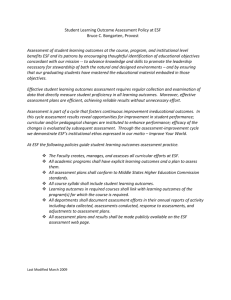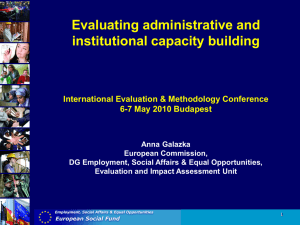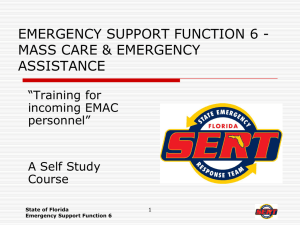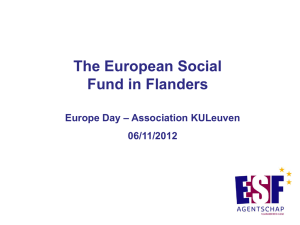Assessment of administrative and institutional capacity building
advertisement
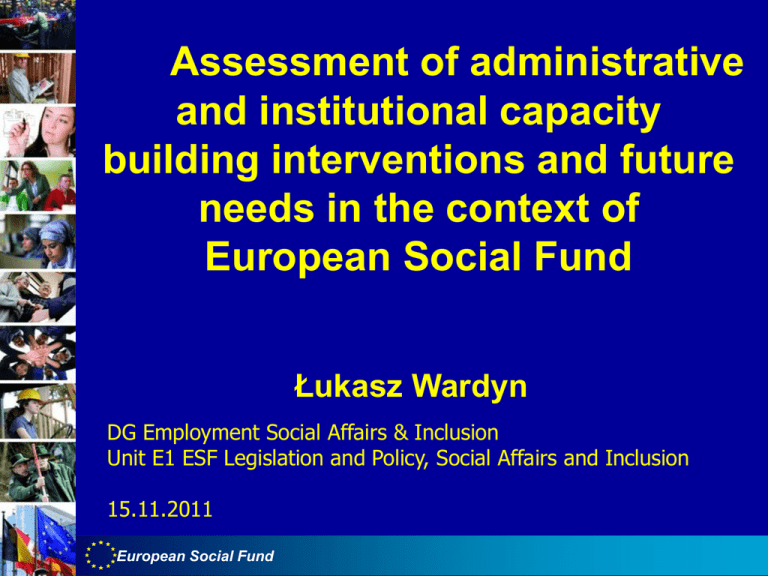
Assessment of administrative and institutional capacity building interventions and future needs in the context of European Social Fund Łukasz Wardyn DG Employment Social Affairs & Inclusion Unit E1 ESF Legislation and Policy, Social Affairs and Inclusion 15.11.2011 European Social Fund ACB: NEW in 2007-2013 NEW in 2007-2013: Strengthening institutional capacity and the efficiency of public administrations (Art. 3(2)(b)) 2.7% of all ESF funds (1,9 bn EUR) in 18 MS MS allocated between 0.1% (Spain) and 16.5% (Lithuania) or between EUR 5 mln in Cyprus and EUR 520 mln in Poland European Social Fund Introduction: Aims of the study 1. Analyse the relevance of ESF interventions in administrative and institutional capacity building (ACB); 2. Analyse the efficiency, effectiveness and sustainability of those interventions; 3. Elaborate recommendations on how this priority could work for the ESF in the future. European Social Fund Evidence base emerging from: Individual interviews carried out : 104; Involved in focus groups: 65; Literature/documentary review and qualitative research; Analysis at 3 different levels: EU, country and case study; In-depth analysis of 10 selected countries (BG, EL, HU, LT, PL, PT, RO, SL, ES and UK Wales); Central validation workshop in Brussels 09.09.2010 European Social Fund Key issues Administrative capacity issues themselves can be clearly categorised: Structures: legislation, delivery, coordination, and partnership; Human resources: competence gaps, staff turnover; Systems & tools: use of ICT,management information systems, finance, and monitoring and evaluation European Social Fund Overview of ESF eligible areas Improved competitiveness and cohesion Better response to citizen's and firms' needs Effective governance Increased capacity for partnership - Civil society - NGOs - Agencies Political support - Long-term orientation and stability - Transparency - Professionalisation Public administration performance Public Administration reform policies and strategies Administrative capacity Stronger Structures Legislation Links with delivery Partnership potential Stronger Human resources Competences '= Some ESF intervention possible '= Limited or no ESF intervention European Social Fund Better systems and tools Staffing Resourcing ICT, MIS Finance, M&E = Strong ESF intervention possible Relevance of ESF interventions in ACB Overall, ESF responds well to the domains of ACB – with some exceptions (e.g. need for political leadership, support to staffing etc.); Links with the Lisbon Agenda are often indirect and difficult to measure; links are more direct in case of ‘vertical’ actions; concerns relate to the usefulness and soundness of the PAR strategies as a frame for action; strong reliance on outside experts. European Social Fund Effectiveness of ESF First achievements visible and emerging from the current programmes: Implementation of HRD strategies; Overall change and culture; Improving service efficiency; E-governance and E-services; Improvements in collaborative working. European Social Fund Success factors at programm level Clear strategic direction; Stable and favourable (political and socio-economic); Implementation through programming; Consistency and continuity in thematic focus; Limited staff turnover; Involvement of civil society; Proper use of systems and tools; European Social Fund Success factors at project level Being embedded in broader cultural and organisational change processes; Involve civil society and/or social partners; A clear methodological and technical approach; Political commitment; Clear definition of responsibilities; Involvement in exchange of best practices at EU level; Monitoring and Evaluation techniques introduced; Continuity and stability in the project environment. European Social Fund Outline for a future ACB Three options to be considered: Option 0: Discontinuing ACB support; Option 1: Continuation and optimisation (revision of to support the Europe 2020 strategy; attention to M&E, increased learning, implementation at least at level of Priority Axis); Option 2: A focused and conditional/voluntary ACB (extended beyond Convergence regions; European Social Fund Recommendations I 1. Continued support to ACB should be based on a comprehensive PAR-strategy; 2. The division of responsibilities for PAR should be prevented; 3. There should be more focus on user needs and be based on: structures, human resources and systems and tools; 4. Interventions should be related to Europe 2020 Guidelines and include performance indicators; 5. Involvement of senior civil servants, leaders and managers in the skills development; European Social Fund Recommendations II 6. Involvement of NGO's in the policy cycle (formulation, implementation and evaluation); 7. A real needs assessments as a precondition of any support and evaluation prior the finalisation; 8. For any assessments measures are to be built in to guarantee the follow-up of activities; 9. The financed actions evaluated based on objectives, rather than by input; 10. Exchange of knowledge and best practice at national and EU level European Social Fund Thank you for your attention ! More information: www.ec.europa.eu/esf www.ec.europa.eu/employment_social/esf/fields/p ublic_en.htm www.ec.europa.eu/regional_policy/index_en.htm European Social Fund
